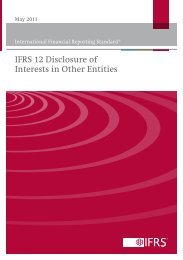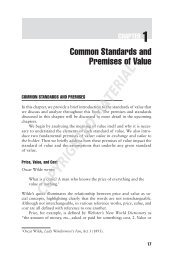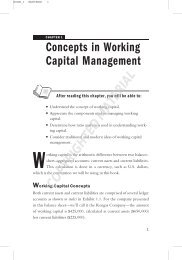ISSUE 5 2008 - Sweet & Maxwell
ISSUE 5 2008 - Sweet & Maxwell
ISSUE 5 2008 - Sweet & Maxwell
Create successful ePaper yourself
Turn your PDF publications into a flip-book with our unique Google optimized e-Paper software.
Crim. L.R. Code C of Codes of Practice to PACE 383<br />
Case and Comment<br />
Editor: Professor David Ormerod, LL.B.<br />
Commentaries by Professor David Ormerod, LL.B., Professor Andrew Ashworth,<br />
Q.C., D.C.L., F.B.A., Andrew J. Roberts, LL.B., M.Phil., N. W. Taylor, LL.B,<br />
M.Phil., B.J. Fitzpatrick, B.A., Neil Kibble, LL.B., LL.M.<br />
Sentencing Cases and Commentaries by D. A. Thomas, Q.C., LL.D.<br />
Code C of Codes of Practice to PACE<br />
Whether requirement for written record to be made of comments made by defendant outside<br />
context of interview where statements made during commission of public order offence<br />
Causing harassment alarm or distress; Exclusionary discretion; PACE codes<br />
of practice; Police interviews; Police records; Statements; Unfair evidence<br />
DPP v Lawrence<br />
Divisional Court: Auld L.J. and Collins J.: July 16, 2007; [2007] EWHC 2154<br />
(Admin).<br />
Police officers stopped a car containing the appellant and others. The officers,<br />
on speaking to them, formed the opinion that they had grounds to search them for<br />
drugs. The appellant allegedly then became aggressive and abusive and repeatedly<br />
told the police officers to ‘‘fuck off’’. The officers allegedly warned him about his<br />
behaviour, and told him that they would arrest him if he did not stop it. He did not<br />
stop it, and they arrested him and took him to the police station. It was not clear<br />
whether the appellant said anything when charged with an offence of disorderly<br />
conduct contrary to s.5 of the Public Order Act 1986 other than that he denied the<br />
charge. It was common ground that he was not interviewed before or after being<br />
charged. In due course, as a result of informal advance prosecution disclosure, the<br />
appellant was notified before trial of the police officers’ proposed evidence in the<br />
form of copies of their witness statements, and had an opportunity at the hearing,<br />
if he wished to take it, to contradict it. However, at the close of the prosecution<br />
opening, the justices, having been informed that the appellant’s advocate intended<br />
to apply under s.78 of the Police and Criminal Evidence Act 1984 (PACE) to<br />
exclude evidence from the officers as to what the appellant had said at the scene,<br />
decided to determine that issue without first hearing any evidence from the police<br />
officers or Lawrence. The issue for the justices turned on PACE Code C Pt 11,<br />
which was headed ‘‘Code of practice for the detention, treatment and questioning<br />
of persons’’, and more particularly, para.11.13. Part 11 of Code C, of which<br />
para.11.13 formed a part, was directed at the stage at which a person detained by<br />
the police was interviewed about the offence he was alleged to have committed, or<br />
at the stage when there was or might have been an exchange between such a person<br />
and a police officer about that alleged offence. He argued that there had been a<br />
breach of the ‘‘verbal’’ provisions of Pt 11.13 with the consequence that for the<br />
justices to admit evidence of what the appellant had allegedly said to the officers at<br />
the scene would have such an adverse effect on the fairness of the proceedings that<br />
the justices should, in the exercise of their power under s.78, exclude it. Secondly,<br />
it was maintained that it was unfair of the police not to interview the appellant<br />
© SWEET &MAXWELL






